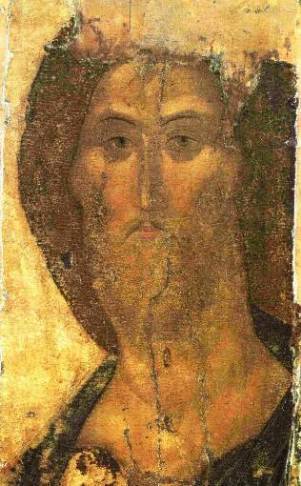New earth beneath the new heaven
 After Satan is cast down into the lake of fire, John pictures the Last Judgment. From the presence of the One Who sat upon the throne "earth and heaven vanished away, and no place was left for them" (20:11) while immediately after the judgment John "saw a new heaven and a new earth" (21:1).
After Satan is cast down into the lake of fire, John pictures the Last Judgment. From the presence of the One Who sat upon the throne "earth and heaven vanished away, and no place was left for them" (20:11) while immediately after the judgment John "saw a new heaven and a new earth" (21:1).Are we to take this as full destruction of the material Cosmos and its recreation from nothing? If so, that would imply that God had "failed" with His act of Creation, which would contradict the Book of Genesis, to wit: "And God saw that it was good" in respect of the creation of the heaven, the earth and light (Gen. 1:10; 1:18).
Rather is this the full and final assessment of the material Cosmos as the product of the creativity of angels and men, meaning that part had been irretrievably spoilt and needed to be destroyed while part was to be preserved and elevated to a higher rung of being.
The spiritual center of the new earth is "a great high mountain" (21:10), a top which is "the holy city new, of Jerusalem, coming down out of heaven from God" (21:2), through which the river flowed of the water of life issuing from the throne of God and of the Lamb, on either side of which stood a tree of life yielding crops of fruit for each month of the year, with "the leaves of the trees for healing the nations" (22:1-2).
"And the city had no need of sun or moon to shine upon it; for the glory of God gave it light, and its lamp was the Lamb" 21:23.
There was no temple in the city,
"for its temple was the sovereign Lord God and the Lamb" 21:22.
"By its light shall the nations walk and the kings of the earth shall bring into it all their splendor" 21:24.
"He will wipe every tear from their eyes; there shall be an end to death, and to mourning and crying and pain; for the old order has passed away!" 21:4.
Though the Kingdom of God described in the Revelation may seem a lovely pipe dream, which has nothing in common with real life, the devout knows that the seeds of the Kingdom of God are planted long ago and that the Kingdom of God has taken firm root in history. Whether Moses on Sinai, Jesus on Tabor, the proto-martyr St. Stephen, or many other holy men, they already shone with the Divine light that the Revelation mentions. Indeed, Jesus directly intimates that the light upon Mt. Tabor is "the Kingdom of God already came in power" (Mark 9:1-9). Far greater though is the number in whom the Kingdom of God is not that much in evidence but who have unnoticeably yielded their main fruits, their "justice, peace, and joy, inspired by the Holy Spirit" (Rom. 14:17).
The spiritually blind do not see this Kingdom, and the Revelation's radiant prophecies seem fabulous fantasy for them, they are focused on the grievous, gloomy and wicked. But for those who have already entered this Kingdom or if only slightly have touched it the Revelation's prophecies of the future life are not any quite unexpected or entirely unfamiliar. It is the revelation how the mysterious things will become evident; how that the Kingdom which is hidden deep in hearts (Lk. 17:21) will fill the world: a new earth beneath a new heaven.
That ominous hardening against the world, that historical pessimism are symptoms of little faith. The Revelation testifies that the forces of evil lose in history and the meta-historical perspective.
For Jesus Christ, as God and Lamb, to accomplish His mission, the existence of evil is not essential, the more so as evil volition is primarily spearheaded against this mission. However man's salvation from doom only more profoundly reveals the love that God bears for His creation. Meanwhile man's capacity for responding to this love in conditions of triumphant evil only more fully confirm God's creative power; He created man well and “highly well” (Gen. 1:31).
On the new earth there will be no evil and “nothing unclean shall enter the holy city nor anyone whose ways are false or foul” (21:27). Life devoid of evil may appear bland and plane, having no unexpectedness and dramatic tension. That seems because of the same little-faith. Endless prospects of creative advance are so deep that cannot be imagined now. Thus does the child stand in no need of evil to attain the fullness of life, as each day he discovers something new.
Creativity in union with God that is geared to self, kin and the environment, brings nearer the triumph of the Kingdom of God. Powerfully stimulated by the arrival of the apocalyptic epoch, this creativity will blossom in the Thousand-year Kingdom and comprise the basic substance of future life.
The Holy Scriptures attest, from beginning to end, to God as the Creator, the Maker,
from:
"In the beginning God created the heaven and the earth" Gen. 1:1.
to:
"I am making all things new" Rev. 21:5.
"Amen. Come, Lord Jesus!" Rev. 22:20.

